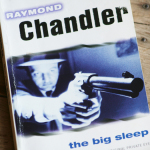
Exposition is a mode of rhetoric, and as Wikipedia notes, its purpose is to ‘explain, inform or even describe’. Since a novel without explanation, information or description would resemble a car crash, let’s talk about why exposition in fiction is such a no-no.
Firstly, consider Chandler’s Marlowe:
I was neat, clean, shaved and sober, and I didn’t care who knew it. I was everything the well-dressed private detective ought to be. I was calling on four million dollars.
At face value this passage simply imparts information. Marlowe tells us he’s a private detective; he tells us he’s clean and tidy and sober; he tells us he’s here to meet with wealth
Why, then, is it not exposition?
The answer is that it also tells a second story. Beneath the image of Marlowe in his washed, shaven sobriety lurks the image of the character as unwashed, unshaven and drunk. By the simple ruse of emphasising his clean sobriety, Marlowe reveals that this is not his usual state. Furthermore, since the reason for the change is four million dollars, we can deduce that the character has a keen eye for money.
In other words there’s more to the writing than what’s said. There’s also the manner of speaking: just note the clipped phrasing and dry, asentimental language. All these elements reveal character without resorting to lists of facts.
By not stating character traits directly, Chandler allows us the pleasure of interpreting for ourselves. Indeed interpretation becomes a motor for continued reading. We read to ‘find out’ the truth of the story, which after all is little more than a ’tissue of lies’.
Even the most plot-driven works find ways to deliver basic information without telling. Have you read any Stephen King? Think of the ways mood and tone are suggested through frequent depictions of minor perplexity or domestic incapacity, and how these foreshadow bigger crisis-stricken moments to come. On one page a character will be struggling to get the damned phone to work; down the track he’ll be fighting signal-warped zombies who used to be his neighbours and friends. King doesn’t need to say a character ‘felt terribly apprehensive’ because his story builds apprehension at every turn. You can bet that if he did feel the need to say his character felt terribly apprehensive, it would come across through a prickling of the nape hairs or something else the reader has to interpret — a physical response, sensory imagery, not an explanation.
The problem with exposition is that it only conveys one message: what the writer wants to the reader to know. Because fiction works by concealing its information behind devices like characterisation, imagery and voice, telling the reader what they’re meant to know instantly breaks the spell. Pop! All that lovely spellbound engagement falls away.
I’ve heard it said that a certain amount of exposition is necessary in fiction, but I’d rather argue that a certain amount of information–telling is requisite. The trick is to couch it in a way that rewards interpretation rather than kills it.
Meanwhile, embodying characterisation in voice, telling by what’s left out, foreshadowing, setting mood through scenery, using sensory details the reader has to unpack, showing characters acting and reacting — these are just a few of the many ways you can avoid exposition to build better work. I’ll go into more detail on how to do those in a future article.
